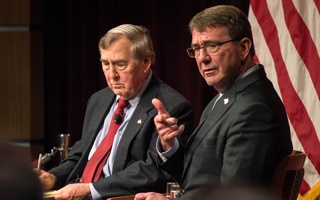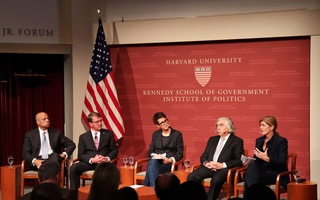{shortcode-4f83a159ef9710fcb55096527278ebcded72404c}
Speaking to a full house at the Institute of Politics, former Secretary of Defense Ashton B. Carter discussed military cooperation with the tech industry, artificial intelligence, and his career at the Defense Department.
Carter served the Department of Defense for 35 years in various roles, most recently as Defense Secretary under the Obama administration. Appointed after Charles T. Hagel's resignation in 2015, Carter led the department through the end of Obama’s presidency. At the end of the academic year, he will join the Kennedy School as director of the Belfer Center for International Affairs.
“This new job has the mission to which I want to dedicate the next phase of my life,” Carter said of his new role.
Carter started his career as a physicist, receiving his B.A. in Physics and Medieval History from Yale in 1976. Carter later studied at Oxford University as a Rhodes Scholar, receiving a Ph.D. in theoretical physics from the school in 1979.
“I was one of those student who… came out of a public school in Philadelphia—no preppy distractions. It was just ‘I’m paying the money, I’m gonna get the education,’” Carter said.
Carter spoke of the importance of military research and development spending, citing technologies and innovations that have arisen from military technologies later picked up by the tech industry.
He emphasized his desire to “build bridges and make connections” with the tech industry to partner for the public good.
“The spirit is there, with many innovators, but the bridge to connect them to public projects is not,” Carter said.
Asked by one attendee about artificial intelligence, Carter contrasted the private development of AI to the public development of nuclear equipment in the 40's and 50's. He said the military will be unable to control the dissemination of artificial intelligence like it could for nuclear weapons.
“AI as a technology… will take place in the private sector,” Carter said. “Fortunately nobody has privatized nuclear weapons.”
Carter listed what he described as the five primary defense issues facing the country in the near future: destroying ISIL, countering Russian aggression, maintaining stability in the Asian Pacific, checking Iran’s influence in the Gulf, and deterring North Korea.
Domestically, one of Carter's historic decisions at the Department of Defense was his opening of all combat positions in the military to women, a decision which received both support and criticism from service members and the public.
“I [opened all combat positions to women] because 50 percent of the population is just not something an all-volunteer force can afford to waste,” Carter said of the decision.
General Jim Mattis, the newly-appointed Defense Secretary under President Trump, has publicly said he will not overturn Carter’s decision or the 2011 repeal of “Don’t Ask, Don’t Tell” policies.
—Staff writer Lucas Ward can be reached at lucas.ward@thecrimson.com. Follow him on twitter at @LucaspfWard.
Read more in News
BGLTQ Office Prepares For Visit of Anti-Transgender 'Free Speech' BusRecommended Articles
-
No HeadlineThe bronze statute of Hermes, presented to the Medical School by the late John W. Carter, has been placed on
-
K-School Professor Confronts Iran Pres.President Bush avoided a face-to-face confrontation with Iranian leader Mahmoud Ahmadinejad at the United Nations last week, but elsewhere on
-
Ash Carter May Join Obama TeamHarvard Kennedy School professor Ashton B. Carter may return to the Pentagon after nearly a decade in academia. Carter, the
-
 Secretary of Defense Talks Military Recruitment and ISIS
Secretary of Defense Talks Military Recruitment and ISIS -
 Former Obama Officials Talk National Security
Former Obama Officials Talk National Security













